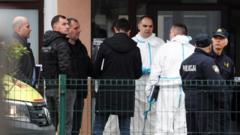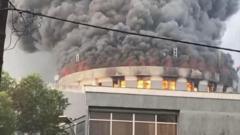Protests in Tbilisi have reached new heights as citizens clash with police following the suspension of the EU membership bid, highlighting ongoing political unrest in Georgia.
Tensions Escalate in Tbilisi as Protests Erupt Over EU Membership Suspension

Tensions Escalate in Tbilisi as Protests Erupt Over EU Membership Suspension
Thousands of Georgian citizens take to the streets in response to the government’s recent policy changes regarding European Union integration.
The Georgian capital of Tbilisi saw another night of clashes late Saturday between protesters demanding European Union membership and riot police responding with force. This unrest was triggered by Prime Minister Irakli Kobakhidze's announcement that the country would delay its EU accession bid until 2028 and would refuse financial aid from the bloc, leading to significant public outcry.
Since Thursday night, thousands of demonstrators have gathered in Tbilisi, expressing their discontent with the government's shift toward Russia and China, perceived as a dismissal of Georgia’s European aspirations. The Interior Ministry reported that the situation had “evolved into violence” overnight, with demonstrators reportedly throwing pyrotechnics and igniting objects towards police and Parliament while causing damage to public property.
As of Saturday night, more than 100 arrests were made, and injuries among protesters and police were documented, showcasing the escalating tensions after weeks of political instability, following the disputed parliamentary elections that granted the Georgian Dream party control amid allegations of electoral fraud.
Georgia's governmental framework mandates a commitment to EU and NATO integration, a principle strongly supported by opposition leaders and the country’s president, Salome Zourabichvili. She alleged that the government's actions constituted a “constitutional coup,” and denounced their methods as illegal, further fueling dissent among citizens standing for what they view as their rightful choice for a European path.
Protests have continued to mobilize, with citizens visibly expressing their frustration by setting fire to effigies of the Prime Minister and displaying symbols of their allegiance to the EU, Ukraine, and Georgia. As clashes persisted into the early morning hours, the future of Georgia's political landscape remains uncertain as citizens push for the government to reconsider its stance on European integration.
Since Thursday night, thousands of demonstrators have gathered in Tbilisi, expressing their discontent with the government's shift toward Russia and China, perceived as a dismissal of Georgia’s European aspirations. The Interior Ministry reported that the situation had “evolved into violence” overnight, with demonstrators reportedly throwing pyrotechnics and igniting objects towards police and Parliament while causing damage to public property.
As of Saturday night, more than 100 arrests were made, and injuries among protesters and police were documented, showcasing the escalating tensions after weeks of political instability, following the disputed parliamentary elections that granted the Georgian Dream party control amid allegations of electoral fraud.
Georgia's governmental framework mandates a commitment to EU and NATO integration, a principle strongly supported by opposition leaders and the country’s president, Salome Zourabichvili. She alleged that the government's actions constituted a “constitutional coup,” and denounced their methods as illegal, further fueling dissent among citizens standing for what they view as their rightful choice for a European path.
Protests have continued to mobilize, with citizens visibly expressing their frustration by setting fire to effigies of the Prime Minister and displaying symbols of their allegiance to the EU, Ukraine, and Georgia. As clashes persisted into the early morning hours, the future of Georgia's political landscape remains uncertain as citizens push for the government to reconsider its stance on European integration.





















